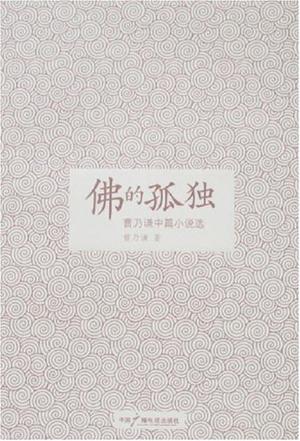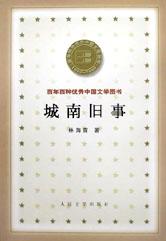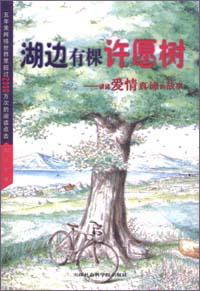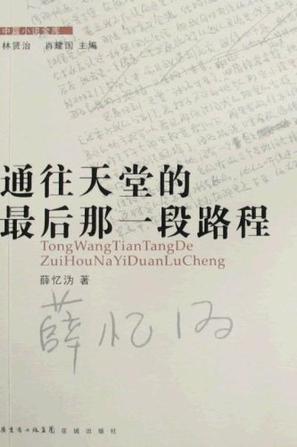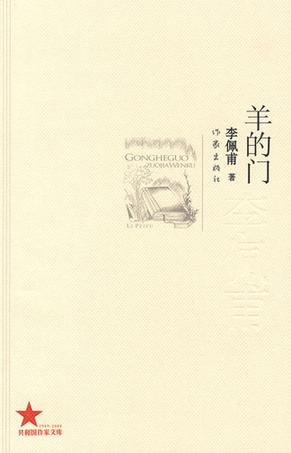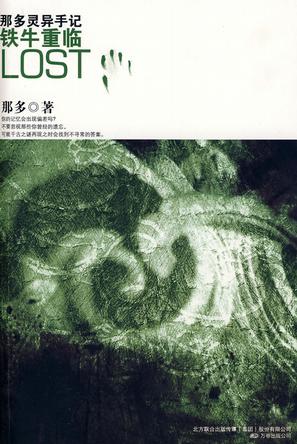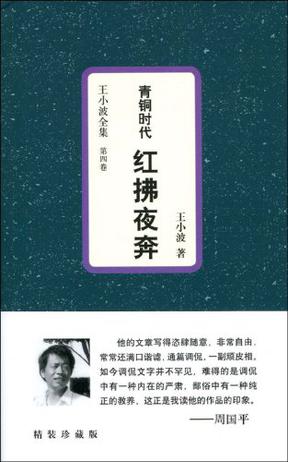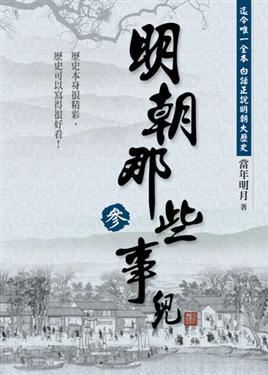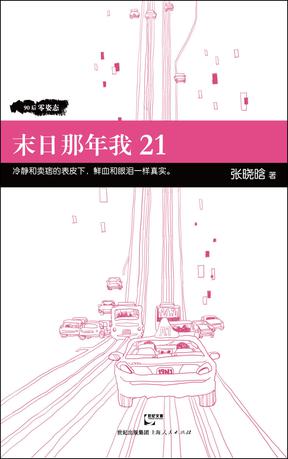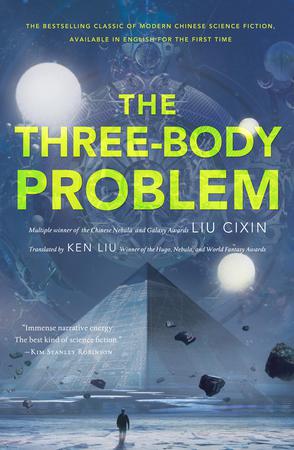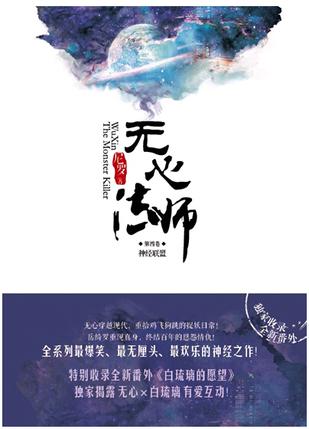欢迎来到相识电子书!
标签:中国
-
佛的孤独
《佛的孤独:曹乃谦中篇小说选》内容简介——难以割舍的眷眷亲情,青涩淡淡的初恋情窦,纯真朴实的儿时友谊,激荡年代的插队记忆:那穗儿、那柳姐、那善缘和尚……他们的故事读来曲折哀婉、情节扣人心弦、结果常常令人震撼。这一个个鲜活的人物串联出一个纯真少年在上世纪五六十年代的别样青春成长历程,透过少年的眼睛,折射出作者对生活深厚的感悟,对社会责任和良心的理性思考。 -
私宴
苏童是中国新时期文学的重要作家,他自上世纪八十年代开始创作以来发表了大量的长、中、短篇小说,中国新时期的许多小说思潮均与这位年轻的老作家有关。比如先锋小说,比如小说电影化,再比如新历史小说等。本书收录了他的部分代表作品,他的小说大都呈现出优雅、阴柔而又凄清、冷艳的风格,美丽的意象下面是死亡的气息与令人不安的阴谋。它可以视作苏童所有小说的样本。这是苏童作品的秘密,如女巫般带来厄运的美丽舞蹈,本书选录了他的12部中短篇小说。 -
七星龍王
一個億萬富豪為什麼會死? 一個普通的生意人真實的身分是什麼? 一個小叫化又會隱藏著什麼背景? 一段十幾年前的愛恨情仇,會帶來什麼樣的浩劫? 過去的恩恩怨怨,現今的是是非非,交織成難解的孽緣.... -
城南旧事
本世纪优秀的中国文学著作,作者林海音(女)虽然1948年去了台湾,但儿时在老北京生活的点点滴滴却没有从她的记忆里消退.惠安馆,兰姨娘,驴打滚...都是作者笔下淡雅的城南旧事,古老,甜蜜,亲切,难以忘怀! -
妻妾成群
与《收获》编辑部的朋友一起编选这本书,心情出奇的美好。借助于这本书,我也回顾了自己的二十年写作生涯,回顾了我与《收获》十八年来结下的缘分友情,突然觉得这么多年来,我不是一个人在孤灯下写作的,我的背后站着许多人,包括我的亲人,我的朋友,包括生活在另一个城市里的《收获》的朋友们,我们一直在一起。写作从某种意义上说是一件不破不立的事情,写作之路是幽暗的迷魂之路,但写作者在猛然回首之间,他所期望的不是路途中照明的火把,是那些朋友熟悉的身影,他所关心的是一个写作无关的事情,朋友,他们还中那儿吗? -
湖边有棵许愿树
书摘 爱的寻呼 一天男孩送给他的女朋友一台汉显传呼机,温柔地对她说:“我以后再也不怕找不到你了。”女孩调皮地说:“如果我离开这座城市,你就呼不到我了。” 男孩得意地摇摇头:“我可是办了漫游的,无论你走到哪里我都会呼到你。” 女孩问他传呼号是什么,男孩说:“这是爱情专线,号码不公开。” 从此女孩每天都把它带在身边,一刻也不离开。 在一个阳光明媚,让人有一份好得不得了的心情的周末,女孩只留了一张字条给父母,坐上汽车奔向邻近的县城玩,但是没有人知道女孩正走向一场灾难。 女孩在县城玩了一天,拖着沉沉的脚步找到了一间带沐浴间的小旅馆。一走进房间,女孩迫不及待地走进浴室,想洗去一身的疲惫。当女孩正准备脱衣服的时候,脚下一阵晃动,她急忙扶住一根铁管,心想是错觉?但是当第二次晃动,女孩知道这不是错觉。跟随第二次晃动中还带有急促和沉闷的断裂声,女孩的全身开始战栗,她知道可怕的地震来了,随着第三第四次的更加猛烈的震动,无边的黑暗和无边的恐惧把女孩紧紧地包裹起来。 女孩像一只受伤的野兽,拼命放声号叫,拼命地拍打、撕咬浴室的门板。 然而一切都是徒劳的,女孩无力地蜷缩在阴凉冷漠的地上。 不知过了多久,忽然腰间一阵颤动,是呼机。 女孩匆匆地摘下它,在黑暗中摸索着按到了键子,即看到了绿色的光芒:“林先生请你七点钟到老地方见面。”读着这句话,女孩的泪水又一次涌出来,滑过嘴角,咸涩涩的。 想着电话那边的他,女孩又再一次尝试着走出困境,但是是再一次的徒劳与绝望。 女孩跌坐在地上,把自己缩成一团,眼睛盯着呼机的屏幕。 不知过了多久,女孩睡着了,又不知过了多久,呼机再一次在女孩的手中颤动了:“林先生问你在哪里,请速回电话。”女孩再一次的流下眼泪,我想告诉你我在哪里,但是我办不到啊。 渐渐地女孩平静了下来,面对无法挽回的死亡,女孩不知道自己还能做什么。 第三次震动:“去了你家,看到你留下的字条,请火速回家。” 女孩的心又开始躁动。 呼机第四次震动:“我听到广播,知道你那里发生了什么,相信你此时正拿着呼机读我的话,我们很快会见面的。”似乎有一缕曙光在女孩的眼前闪过。女孩期待呼机第五次的震动,此时的呼机成了她生命惟一的寄托。 时间一分一秒地过去了,呼机像一个疲惫的孩子一样睡着了。 终于第五次的震动来了:“我去找你,车不通,想尽各种办法,还是无功而返。我相信你不会出问题的,你是一个聪明又好幸的女孩。我等待你的归来!” 第六次,第七次……女孩在男孩一次又一次的传呼中度过了一个又一个恐惧与绝望的时刻,不知不觉已经两天两夜了。死亡的阴影越来越紧地箍住女孩的全身,仿佛看到自己体内的鲜血和肌肉正被一条黑色的巨蛇一口一口贪婪地吞噬。 -
玻璃虫
《玻璃虫》是一部作者虚构的关于自己电影生涯的回忆录,但如果不是作者的强调,很容易误会林白讲述的是真实的故事。真实使人感到亲切,而虚构则带给作品生动的品质,使阅读更加愉快。 林白无限缅怀她的八十年代,那青春时代的爱与性,浪漫与懵懂,无畏、任性与漫不经心… …相比较于九十年代,八十年代的文学狂热,八十年代的艺术狂热,八十年代的纯朴激情, 八十年代的各种鲜活欲望,是多么罗曼蒂克啊!在回忆中尽情想象,张开敏锐的感觉,林白创造出流动的、班斓的、洋溢着声色之美的叙述语言,它们令人心醉神迷。 -
一腔废话
《一腔废话》写的是在一个叫五十街西里的地方,住着一群富于幻想的人们。这些修鞋的、搓澡的、卖杂碎汤的、当三陪的、捡破烂的,每天向往的都是和自己无关的生活。他们喜欢模仿秀、辩论赛和欢乐总动员。他们喜欢在修鞋时、搓澡时、卖杂碎汤时、饭后茶余说些笑话。但是突然有一天,他们被自己所说的话和做过的事吓破了胆。为了恢复往常的生活,他们齐心协力开始对自己说过的话和做过的事进行修补。一些人开始倾家荡产地补胆、补钙、换血或换了自己;一些人开始滔滔不绝地说些车轱辘话,一天下来又发现说的全是废话。这时他们开始怀疑:我们是不是有些疯和有些傻呀。为了找到医治的办法,他们不远千里来到了异域异地。从表面上看,他们的巡游有着非常伟大的现实目标,即为了寻找疯和傻的原因;而在实际过程中,他们却不断地挣脱了一个又一个的常识和经验,使寻找一步步地陷入极为可怕的历史内幕中。 -
姨妈的后现代生活
这部小说里有这样一群人—— 他们面对繁华的世界心态复杂;他们青春不再又不甘于社会边缘顿挫;他们的生活令人啼笑皆非、辛酸难忘……他们是我们的一部分 。人们常说,时间在流逝,其实不对。时间是静止的,是我们在流逝…… 知名获奖故事影片《孔雀》的编剧李樯在读了这个小说之后深受触动,即与香港著名女导演许鞍华决定联手合作改编成同名电影,著名影星斯琴高娃、周润发、赵薇联袂主演。这部电影亦被称为2007年最发人深思之作。 这是一部描写当下城市中老年女性生存状态的长篇小说。作家以上海的现代都市生活为背景,讲述了一位知识女性退休后充满戏剧性的悲喜命运故事。女主人公叶如棠清高孤傲一生,退休后面对汹涌澎湃物质与金钱至上、消费主义的氛围,陡然发现自己成了一个境地尴尬的文化人。这个早年有过不幸的爱情、经历过婚变的女人,在新的生活浪潮中又面临着不甘寂寞、子女不孝和“黄昏恋”等一连串的心灵困境,很快陷入了多重的矛盾之中,她的每一次的奋斗与挣扎,都伴随着的复杂的心理嬗变———在看似幸福温馨的现代都市生活中,有着许多像“姨妈”这样孤清的老人,他们面对繁华的世界心态复杂:他们青春不再又不甘于社会边缘顿挫,他们既不是富人,也不能说是穷人,然而却深陷于生存差距形成的情感漩涡中,对家庭幸福与亲情的渴望与失望,对世俗标准的追逐与失落使得他们的生活令人啼笑皆非又辛酸难忘以至于触目惊心…… 这部小说充满了人文关怀的情愫,对当代都市生活有着切身的体验与感悟。本书通过纯熟的艺术手法表达了她对知识女性生存状态的深入观察以及一个有社会责任感的作家的忧虑、悲悯和感伤。始终以一种清醒与诚恳的愿望,于啼笑之外呼唤着真情与爱,让读者从中感悟人间真情的渴望,无以规避对于人生价值的追问。 -
通往天堂的最后那一段路程
《通往天堂的最后那一段路程》在关于革命和战争的传统主题上,开拓出了一个新颖的思考和想象的空间。本书以薛忆沩这篇解构历史而又震撼心灵的小说为主体,配合以他的《首战告捷》等三篇“战争系列”小说,通过“历史外面的历史”来审视个人在历史中的微妙处境,从一个独特的角度展现了一个不容忽视的深度。 -
羊的门
《羊的门》讲述了:中国巨轮,乘风破浪,高歌猛进,短短六十载,已屹立于世界强国之林,成为人类文明史的一个伟大奇迹。中国文学,风起云涌,蒸蒸日上,流派异彩纷呈,名家力作迭出,同样令世人瞩目。为庆祝人民共和国成立六十周年,我社启动“共和国作家文库”大型文学工程,力图囊括当代具有广泛影响力的重要作家的代表作品,以中国风格、中国气派和文学价值观上的人民立场,展示东方文明古国的和平崛起、历史进程、社会变迁与现实图画,表现中华民族的艰辛求索、勇敢实践、创新思想及生存智慧。这套文库,既是欣欣向荣的中国文学事业的一个缩影,也是生机勃勃的转型期中国出版界的一件盛事,其文学价值和社会意义,将随着时间的推移而日益显示出来。我们同时相信,中国的文学事业将伴着蒸蒸日上的伟大祖国更加繁荣、更加绚丽。衷心感谢中宣部有关部门、中国作家协会和全国广大作家、文学评论专家给予本文库的大力支持。 -
华音流韶·雪嫁衣
何为天下?天下,是最初诞生的文明。天下,即我。 何为天下?振长策而御宇内,吞二周而亡诸侯,威震四海。天下,是始皇帝之残暴,之威严。 犯强汉者,虽远必诛。天下,是汉武帝之骄傲,之武功。 万国来宾,为天可汗。天下,是唐率宗之雍容,之文明。 何为天下?站在御宿山上,周围三十六里,便是天下。武功文化,秦皇汉武,英雄豪杰,都毫无意义。只因这里有一个绝顶的名——华音阁。 步非烟“华音流韶”系列之七。 华音阁阁主卓王孙为了医治妹妹小鸾,决定前往海外寻医,途中遇见海岛幻境,更有杀手拦路。而秋璇为了救落入魔手的相思,以自己作为交换,共赴苍茫大海。千里之外的武林盟主杨逸之,亲率两千江湖人士抗倭保国。每个人有不同的目的,却仿佛被命运牵引,最终来到一个以幽冥为名的岛上,于是一场天下浩劫就此开始了…… -
铁牛重临
都江堰鱼嘴在元朝时代是铁牛与铁乌龟,如今不知所终。据说元代治水专家曾用6万斤铁铸成了两只头部相并、屋部分开的铁乌龟用做鱼嘴,明代还用1万多斤铁铸了一只铁牛用做鱼嘴。但后来铁牛和铁乌龟都都被江水冲走了。1990年枯水期时,都江堰文物管理局邀请了相关专家到都江堰内江等地勘探铁牛、铁乌龟的方位。专家的勘探器所到之处,仪器若出现红色的信号,即表示此处有金属存在,但经勘探却没有发现铁牛、铁龟。铁牛和铁龟的去向成了千古之谜。在寻找都江堰中明代铸造的铁牛时,技术人员林翠却迷失了自己。她身在此世,其记忆和言行却仿佛来自另一个世界。那么原来的林翠哪里去了,会有不同的可能世界、不同的林翠吗?如果一个她突然变成了另一个世界的林翠,那多某一天也需要找回原来的自己吗? -
青铜时代红拂夜奔
《青铜时代红拂夜奔(精装珍藏版)》内容为:王二,1993年四十一岁,在北京一所大学里做研究工作。研究方向是中国古代数学史。他是作者的又一位同名兄弟。年轻时他插过队,后来在大学里学过数学。从未结过婚,现在和一个姓孙的女人住在一套公寓房子里。在冥思苦想以求证明费尔马定理的同时,写出了这本有关李靖和红拂的书。这《青铜时代红拂夜奔(精装珍藏版)》和他这个人一样不可信,但是包含了最大的真实性。熟悉历史的读者会发现,《青铜时代红拂夜奔(精装珍藏版)》叙事风格受到法国史学大师费尔南·布罗代尔的杰出著作《15至18世纪的物质文明、经济和资本主义》的影响,更像一本历史书而不太像一本小说。这正是作者的本意。假如《青铜时代红拂夜奔(精装珍藏版)》有怪诞的地方,则非作者有意为之,而是历史的本来面貌。 -
明朝那些事兒 參
今年文壇大黑馬‧2007年網路一哥《當年明月》驚世之作 中國最後一個漢人王朝興衰的全程解說 新浪Sina《當年明月》部落格,至今,每月點擊超過百萬的超強人氣巨著 歷史本身很精彩,歷史可以寫得很好看! 《明朝那些事兒》第三部接續上篇,從明英宗朱祁鎮成功復辟的「奪門之變」後寫起,敘述了忠奸不分的朱祁鎮聽信讒言,殺害曾救其於危難之際的大功臣于謙,而這也成為他繼「土木堡之變」後在歷史上留下的另一大污點。 而在他病逝後,相繼繼位的兩位皇帝,憲宗和孝宗,一個懦弱不堪無所作為,一個心有餘而力不足,撂下的這副重擔落在了明代三百年中最能鬧的一個皇帝──「朱厚照」身上,寵八虎、建豹房、自封威武大將軍,朝廷中充斥著一幕幕荒唐的鬧劇,局勢更是動盪不安,也就在這種情勢之下,一位亙古罕有的文武奇才,踏上了歷史舞台中央,一生傳奇的經歷就此開始,他的光芒將冠絕當代,映照千古,他就是──「王守仁」,清剿盜寇,平定叛王,勇鬥奸宦,給後人留下許多近乎神話的不朽傳奇。 同時,本書本書中仍然不乏大量描寫精彩的權謀之術,戰爭之術,詭詐之術,相信必能一如旣往般深深吸引您的目光。 -
刀子和刀子
《刀子和刀子》讲述泡桐树中学犹如丛林,威肃、神秘的蒋校长居于丛林之首,骄傲的女班主任通过强悍的陶陶,管理着素不服管教的高二(1)班。十八岁的女生何凤,以两把刀子为吉祥物,渴望爱,却留着倔强的板寸;玩世不恭,又时时捍卫真诚。陶陶是她喜欢的男孩,娇媚的朱朱是她的密友。富家子弟阿利以金钱依附于陶陶,以友谊依恋于何凤。混血才女伊娃则以生花妙笔,增添了戏谑和荒诞。然而,一个粗犷的插班生的到来,打破了班级的格局。他出手向陶陶抢夺对阿利的控制,也争夺何凤的爱……于是丛林大乱,群雄逐鹿,不仅是拳头、喋血,还投射着成人世界的谋略、利用、反利用。情节兔起鹘落,女主人公的自叙刚烈、憔悴而又深情。在这个汗腻腻的夏天,他们注定经受生存训练,痛苦、蜕变、成长,并散向四面八方。 点击链接进入: 《盲春秋:中国第一部历史悬疑大作》 《刀子和刀子》 -
慢骑中国
2011年,传叔和麦阔,双人双骑,横穿中国,本书就是讲述传叔他们从南京出发,骑车到拉萨的两个多月行程中的故事,但并非纯粹的游记+攻略+贴士那种流行格式,而是一部自传体小说。因为是写骑车的事情,传叔戏谑地称之为“自转体”。 小说以2011年骑车横穿中国为背景,以《袜子神教诲录》贯穿全文,将一路骑行(尤其是天路骑行)所必须注意的技巧性知识融贯其中,有趣味的传达给读者。也可以看作一本骑车爱好者必看的单车生活手册,尤其适合长途骑行、超长途骑行者(单次旅行至少三个月以上者)。 横穿中国路线图,http://www.douban.com/note/180278105/ 本书入选《新京报》(10月26日)书评周刊的秋季书选,评论曰:和市面上流行的游记不同的是,这本书不记流水账,不秀风景和人像来满足自己那点“在路上”的优越感,不忽悠你旅行是一种更优越的生活方式。相反,你可以把这本书当作“骑行者指导手册”+“自传体小说”来读。从中,你可以找到实用、细腻的骑行指导,以及一个长期在路上的人对生活和旅行相当深入的反思。 编辑推荐: 市面上已有的单车旅行类图书,大都是游记流水账为主,有些甚至文图不匹配,而关于单车上路的实用性指导则几乎没有。《慢骑中国》则完全以实用指导为出发点,为那些从未出过远门的单车爱好者提供最贴心、细腻的指导。 《慢骑中国》语言诙谐幽默,读来轻松,尤其每章卷首的《袜子神教诲录》,更是骑车人以及户外旅行爱好者必备的名言警句;同时又不乏深邃的思考与反省,特别是在叙述人称转变过程中,充满了人文主义的色彩。 在骑行已经成为一种时尚,甚至单车入藏成为一大俗的今天,作者极力提倡一种“慢骑”的理念,即随性自由的旅行乃至生活方式,这在快节奏的当下具有很强的启示和引导意义。 豆友推荐: 真是一本让人读过之后变得不安分的书,只有你离家远行,千山万水,一去经年,你才能明白袜子神真的就在那里,祂就是旅途上的那些一期一会的神奇。——导演、影评人 胤祥 我只是十分好奇,一个怎样的人才会放弃安稳的工作而选择过那种风餐露宿的动荡日子的呢?更令我好奇的是,他是如何抵御住那些关于金钱、事业、婚姻等等来自红尘滚滚的诱惑或者压迫,就这么“坚持”旅行十多年的呢?——资深职业培训师 店长大人 作为一个周游世界的人,我要说,这是少见的有丰富内容和细节的旅行书,充满了智慧和戏虐的记录,比其他空有其名的旅行书好太多了。——著名旅行家 赵行德 感觉慢骑旅途中的传叔,有点像边行路边证道的云游僧,只是多了些洒脱不羁。文字亦庄亦谐,沉稳中有戏谑,调侃中见深沉,相信这本书会给许多按部就班地生活的青年读者,带去新的精神坐标。——著名翻译家 Onetti -
末日那年我21
冷静和卖痞的表皮下,鲜血和眼泪一样真实。 《末日那年我21》是90后人气作家张晓晗的短篇小说集,其中包括了她的人气代表作《少年祝安》、《七年之痒》、《喜喜快跑》等。张晓晗的小说以都市青年人的生活为题材,恣意挥洒的情感与摇摆不定的爱情,带来的是一段段值得细细咀嚼的青春年华,在每个人的心中都能掀起一股涟漪。她文字中的有青春的肆意、洒脱、鲜活,但也透露出年少的摇摆与不安定,在她的文字世界里释放的青春焰火,让每一个离青春或远或近的人都能得到片刻享受。 张晓晗,《萌芽》杂志目前人气最高的女作者之一,是《萌芽》最女王、最女流氓、最Nice Legs三项奖的大满贯获得者。也是人人称道的微博段子王。她常以女神、女王、女流氓的多面体展现在读者面前,具有强烈的个人风格。 -
The Three-Body Problem
Three-Body Problem is the first chance for English-speaking readers to experience this multiple award winning phenomenon from China’s most beloved science fiction author, Liu Cixin. Set against the backdrop of China’s Cultural Revolution, a secret military project sends signals into space to establish contact with aliens. An alien civilization on the brink of destruction captures the signal and plans to invade Earth. Meanwhile, on Earth, different camps start forming, planning to either welcome the superior beings and help them take over a world seen as corrupt, or to fight against the invasion. The result is a science fiction masterpiece of enormous scope and vision. ___________________________________________________________________________Excerpt. © Reprinted by permission. All rights reserved. 1 The Madness Years China, 1967 The Red Union had been attacking the headquarters of the April Twenty-eighth Brigade for two days. Their red flags fluttered restlessly around the brigade building like flames yearning for firewood. The Red Union commander was anxious, though not because of the defenders he faced. The more than two hundred Red Guards of the April Twenty-eighth Brigade were mere greenhorns compared with the veteran Red Guards of the Red Union, which was formed at the start of the Great Proletarian Cultural Revolution in early 1966. The Red Union had been tempered by the tumultuous experience of revolutionary tours around the country and seeing Chairman Mao in the great rallies in Tiananmen Square. But the commander was afraid of the dozen or so iron stoves inside the building, filled with explosives and connected to each other by electric detonators. He couldn’t see them, but he could feel their presence like iron sensing the pull of a nearby magnet. If a defender flipped the switch, revolutionaries and counter-revolutionaries alike would all die in one giant ball of fire. And the young Red Guards of the April Twenty-eighth Brigade were indeed capable of such madness. Compared with the weathered men and women of the first generation of Red Guards, the new rebels were a pack of wolves on hot coals, crazier than crazy. The slender figure of a beautiful young girl emerged at the top of the building, waving the giant red banner of the April Twenty-eighth Brigade. Her appearance was greeted immediately by a cacophony of gunshots. The weapons attacking her were a diverse mix: antiques such as American carbines, Czech-style machine guns, Japanese Type-38 rifles; newer weapons such as standard-issue People’s Liberation Army rifles and submachine guns, stolen from the PLA after the publication of the “August Editorial”1; and even a few Chinese dadao swords and spears. Together, they formed a condensed version of modern history. Numerous members of the April Twenty-eighth Brigade had engaged in similar displays before. They’d stand on top of the building, wave a flag, shout slogans through megaphones, and scatter flyers at the attackers below. Every time, the courageous man or woman had been able to retreat safely from the hailstorm of bullets and earn glory for their valor. The new girl clearly thought she’d be just as lucky. She waved the battle banner as though brandishing her burning youth, trusting that the enemy would be burnt to ashes in the revolutionary flames, imagining that an ideal world would be born tomorrow from the ardor and zeal coursing through her blood.… She was intoxicated by her brilliant, crimson dream until a bullet pierced her chest. Her fifteen-year-old body was so soft that the bullet hardly slowed down as it passed through it and whistled in the air behind her. The young Red Guard tumbled down along with her flag, her light form descending even more slowly than the piece of red fabric, like a little bird unwilling to leave the sky. The Red Union warriors shouted in joy. A few rushed to the foot of the building, tore away the battle banner of the April Twenty-eighth Brigade, and seized the slender, lifeless body. They raised their trophy overhead and flaunted it for a while before tossing it toward the top of the metal gate of the compound. Most of the gate’s metal bars, capped with sharp tips, had been pulled down at the beginning of the factional civil wars to be used as spears, but two still remained. As their sharp tips caught the girl, life seemed to return momentarily to her body. The Red Guards backed up some distance and began to use the impaled body for target practice. For her, the dense storm of bullets was now no different from a gentle rain, as she could no longer feel anything. From time to time, her vinelike arms jerked across her body softly, as though she were flicking off drops of rain. And then half of her young head was blown away, and only a single, beautiful eye remained to stare at the blue sky of 1967. There was no pain in that gaze, only solidified devotion and yearning. And yet, compared to some others, she was fortunate. At least she died in the throes of passionately sacrificing herself for an ideal. * * * Battles like this one raged across Beijing like a multitude of CPUs working in parallel, their combined output, the Cultural Revolution. A flood of madness drowned the city and seeped into every nook and cranny. At the edge of the city, on the exercise grounds of Tsinghua University, a mass “struggle session” attended by thousands had been going on for nearly two hours. This was a public rally intended to humiliate and break down the enemies of the revolution through verbal and physical abuse until they confessed to their crimes before the crowd. As the revolutionaries had splintered into numerous factions, opposing forces everywhere engaged in complex maneuvers and contests. Within the university, intense conflicts erupted between the Red Guards, the Cultural Revolution Working Group, the Workers’ Propaganda Team, and the Military Propaganda Team. And each faction divided into new rebel groups from time to time, each based on different backgrounds and agendas, leading to even more ruthless fighting. But for this mass struggle session, the victims were the reactionary bourgeois academic authorities. These were the enemies of every faction, and they had no choice but to endure cruel attacks from every side. Compared to other “Monsters and Demons,”2 reactionary academic authorities were special: During the earliest struggle sessions, they had been both arrogant and stubborn. That was also the stage in which they had died in the largest numbers. Over a period of forty days, in Beijing alone, more than seventeen hundred victims of struggle sessions were beaten to death. Many others picked an easier path to avoid the madness: Lao She, Wu Han, Jian Bozan, Fu Lei, Zhao Jiuzhang, Yi Qun, Wen Jie, Hai Mo, and other once-respected intellectuals had all chosen to end their lives.3 Those who survived that initial period gradually became numb as the ruthless struggle sessions continued. The protective mental shell helped them avoid total breakdown. They often seemed to be half asleep during the sessions and would only startle awake when someone screamed in their faces to make them mechanically recite their confessions, already repeated countless times. Then, some of them entered a third stage. The constant, unceasing struggle sessions injected vivid political images into their consciousness like mercury, until their minds, erected upon knowledge and rationality, collapsed under the assault. They began to really believe that they were guilty, to see how they had harmed the great cause of the revolution. They cried, and their repentance was far deeper and more sincere than that of those Monsters and Demons who were not intellectuals. For the Red Guards, heaping abuse upon victims in those two latter mental stages was utterly boring. Only those Monsters and Demons who were still in the initial stage could give their overstimulated brains the thrill they craved, like the red cape of the matador. But such desirable victims had grown scarce. In Tsinghua there was probably only one left. Because he was so rare, he was reserved for the very end of the struggle session. Ye Zhetai had survived the Cultural Revolution so far, but he remained in the first mental stage. He refused to repent, to kill himself, or to become numb. When this physics professor walked onto the stage in front of the crowd, his expression clearly said: Let the cross I bear be even heavier. The Red Guards did indeed have him carry a burden, but it wasn’t a cross. Other victims wore tall hats made from bamboo frames, but his was welded from thick steel bars. And the plaque he wore around his neck wasn’t wooden, like the others, but an iron door taken from a laboratory oven. His name was written on the door in striking black characters, and two red diagonals were drawn across them in a large X. Twice the number of Red Guards used for other victims escorted Ye onto the stage: two men and four women. The two young men strode with confidence and purpose, the very image of mature Bolshevik youths. They were both fourth-year students4 majoring in theoretical physics, and Ye was their professor. The women, really girls, were much younger, second-year students from the junior high school attached to the university.5 Dressed in military uniforms and equipped with bandoliers, they exuded youthful vigor and surrounded Ye Zhetai like four green flames. His appearance excited the crowd. The shouting of slogans, which had slackened a bit, now picked up with renewed force and drowned out everything else like a resurgent tide. After waiting patiently for the noise to subside, one of the male Red Guards turned to the victim. “Ye Zhetai, you are an expert in mechanics. You should see how strong the great unified force you’re resisting is. To remain so stubborn will lead only to your death! Today, we will continue the agenda from the last time. There’s no need to waste words. Answer the following question without your typical deceit: Between the years of 1962 and 1965, did you not decide on your own to add relativity to the intro physics course?” “Relativity is part of the fundamental theories of physics,” Ye answered. “How can a basic survey course not teach it?” “You lie!” a female Red Guard by his side shouted. “Einstein is a reactionary academic authority. He would serve any master who dangled money in front of him. He even went to the American Imperialists and helped them build the atom bomb! To develop a revolutionary science, we must overthrow the black banner of capitalism represented by the theory of relativity!” Ye remained silent. Enduring the pain brought by the heavy iron hat and the iron plaque hanging from his neck, he had no energy to answer questions that were not worth answering. Behind him, one of his students also frowned. The girl who had spoken was the most intelligent of the four female Red Guards, and she was clearly prepared, as she had been seen memorizing the struggle session script before coming onstage. But against someone like Ye Zhetai, a few slogans like that were insufficient. The Red Guards decided to bring out the new weapon they had prepared against their teacher. One of them waved to someone offstage. Ye’s wife, physics professor Shao Lin, stood up from the crowd’s front row. She walked onto the stage dressed in an ill-fitting green outfit, clearly intended to imitate the military uniform of the Red Guards. Those who knew her remembered that she had often taught class in an elegant qipao, and her current appearance felt forced and awkward. “Ye Zhetai!” She was clearly unused to such theater, and though she tried to make her voice louder, the effort magnified the tremors in it. “You didn’t think I would stand up and expose you, criticize you? Yes, in the past, I was fooled by you. You covered my eyes with your reactionary view of the world and science! But now I am awake and alert. With the help of the revolutionary youths, I want to stand on the side of the revolution, the side of the people!” She turned to face the crowd. “Comrades, revolutionary youths, revolutionary faculty and staff, we must clearly understand the reactionary nature of Einstein’s theory of relativity. This is most apparent in general relativity: Its static model of the universe negates the dynamic nature of matter. It is anti-dialectical! It treats the universe as limited, which is absolutely a form of reactionary idealism.…” As he listened to his wife’s lecture, Ye allowed himself a wry smile. Lin, I fooled you? Indeed, in my heart you’ve always been a mystery. One time, I praised your genius to your father—he’s lucky to have died early and escaped this catastrophe—and he shook his head, telling me that he did not think you would ever achieve much academically. What he said next turned out to be so important to the second half of my life: “Lin Lin is too smart. To work in fundamental theory, one must be stupid.” In later years, I began to understand his words more and more. Lin, you truly are too smart. Even a few years ago, you could feel the political winds shifting in academia and prepared yourself. For example, when you taught, you changed the names of many physical laws and constants: Ohm’s law you called resistance law, Maxwell’s equations you called electromagnetic equations, Planck’s constant you called the quantum constant.… You explained to your students that all scientific accomplishments resulted from the wisdom of the working masses, and those capitalist academic authorities only stole these fruits and put their names on them. But even so, you couldn’t be accepted by the revolutionary mainstream. Look at you now: You’re not allowed to wear the red armband of the “revolutionary faculty and staff”; you had to come up here empty-handed, without the status to carry a Little Red Book.… You can’t overcome the fault of being born to a prominent family in pre-revolutionary China and of having such famous scholars as parents. But you actually have more to confess about Einstein than I do. In the winter of 1922, Einstein visited Shanghai. Because your father spoke fluent German, he was asked to accompany Einstein on his tour. You told me many times that your father went into physics because of Einstein’s encouragement, and you chose physics because of your father’s influence. So, in a way, Einstein can be said to have indirectly been your teacher. And you once felt so proud and lucky to have such a connection. Later, I found out that your father had told you a white lie. He and Einstein had only one very brief conversation. The morning of November 13, 1922, he accompanied Einstein on a walk along Nanjing Road. Others who went on the walk included Yu Youren, president of Shanghai University, and Cao Gubing, general manager of the newspaper Ta Kung Pao. When they passed a maintenance site in the road bed, Einstein stopped next to a worker who was smashing stones and silently observed this boy with torn clothes and dirty face and hands. He asked your father how much the boy earned each day. After asking the boy, he told Einstein: five cents. This was the only time he spoke with the great scientist who changed the world. There was no discussion of physics, of relativity, only cold, harsh reality. According to your father, Einstein stood there for a long time after hearing the answer, watching the boy’s mechanical movements, not even bothering to smoke his pipe as the embers went out. After your father recounted this memory to me, he sighed and said, “In China, any idea that dared to take flight would only crash back to the ground. The gravity of reality is too strong.” “Lower your head!” one of the male Red Guards shouted. This may actually have been a gesture of mercy from his former student. All victims being struggled against were supposed to lower their heads. If Ye did lower his head, the tall, heavy iron hat would fall off, and if he kept his head lowered, there would be no reason to put it back on him. But Ye refused and held his head high, supporting the heavy weight with his thin neck. “Lower your head, you stubborn reactionary!” One of the girl Red Guards took off her belt and swung it at Ye. The copper belt buckle struck his forehead and left a clear impression that was quickly blurred by oozing blood. He swayed unsteadily for a few moments, then stood straight and firm again. One of the male Red Guards said, “When you taught quantum mechanics, you also mixed in many reactionary ideas.” Then he nodded at Shao Lin, indicating that she should continue. Shao was happy to oblige. She had to keep on talking, otherwise her fragile mind, already hanging on only by a thin thread, would collapse completely. “Ye Zhetai, you cannot deny this charge! You have often lectured students on the reactionary Copenhagen interpretation of quantum mechanics.” “It is, after all, the explanation recognized to be most in line with experimental results.” His tone, so calm and collected, surprised and frightened Shao Lin. “This explanation posits that external observation leads to the collapse of the quantum wave function. This is another expression of reactionary idealism, and it’s indeed the most brazen expression.” “Should philosophy guide experiments, or should experiments guide philosophy?” Ye’s sudden counterattack shocked those leading the struggle session. For a moment they did not know what to do. “Of course it should be the correct philosophy of Marxism that guides scientific experiments!” one of the male Red Guards finally said. “Then that’s equivalent to saying that the correct philosophy falls out of the sky. This is against the idea that the truth emerges from experience. It’s counter to the principles of how Marxism seeks to understand nature.” Shao Lin and the two college student Red Guards had no answer for this. Unlike the Red Guards who were still in junior high school, they couldn’t completely ignore logic. But the four junior high girls had their own revolutionary methods that they believed were invincible. The girl who had hit Ye before took out her belt and whipped Ye again. The other three girls also took off their belts to strike at Ye. With their companion displaying such revolutionary fervor, they had to display even more, or at least the same amount. The two male Red Guards didn’t interfere. If they tried to intervene now, they would be suspected of being insufficiently revolutionary. “You also taught the big bang theory. This is the most reactionary of all scientific theories.” One of the male Red Guards spoke up, trying to change the subject. “Maybe in the future this theory will be disproven. But two great cosmological discoveries of this century—Hubble’s law, and observation of the cosmic microwave background–show that the big bang theory is currently the most plausible explanation for the origin of the universe.” “Lies!” Shao Lin shouted. Then she began a long lecture about the big bang theory, remembering to splice in insightful critiques of the theory’s extremely reactionary nature. But the freshness of the theory attracted the most intelligent of the four girls, who couldn’t help but ask, “Time began with the singularity? So what was there before the singularity?” “Nothing,” Ye said, the way he would answer a question from any curious young person. He turned to look at the girl kindly. With his injuries and the tall iron hat, the motion was very difficult. “No … nothing? That’s reactionary! Completely reactionary!” the frightened girl shouted. She turned to Shao Lin, who gladly came to her aid. “The theory leaves open a place to be filled by God.” Shao nodded at the girl. The young Red Guard, confused by these new thoughts, finally found her footing. She raised her hand, still holding the belt, and pointed at Ye. “You: you’re trying to say that God exists?” “I don’t know.” “What?” “I’m saying I don’t know. If by ‘God’ you mean some kind of superconsciousness outside the universe, I don’t know if it exists or not. Science has given no evidence either way.” Actually, in this nightmarish moment, Ye was leaning toward believing that God did not exist. This extremely reactionary statement caused a commotion in the crowd. Led by one of the Red Guards on stage, another tide of slogan-shouting exploded. “Down with reactionary academic authority Ye Zhetai!” “Down with all reactionary academic authorities!” “Down with all reactionary doctrines!” Once the slogans died down, the girl shouted, “God does not exist. All religions are tools concocted by the ruling class to paralyze the spirit of the people!” “That is a very one-sided view,” Ye said calmly. The young Red Guard, embarrassed and angry, reached the conclusion that, against this dangerous enemy, all talk was useless. She picked up her belt and rushed at Ye, and her three companions followed. Ye was tall, and the four fourteen-year-olds had to swing their belts upward to reach his head, still held high. After a few strikes, the tall iron hat, which had protected him a little, fell off. The continuing barrage of strikes by the metal buckles finally made him fall down. The young Red Guards, encouraged by their success, became even more devoted to this glorious struggle. They were fighting for faith, for ideals. They were intoxicated by the bright light cast on them by history, proud of their own bravery.… Ye’s two students had finally had enough. “The chairman instructed us to ‘rely on eloquence rather than violence’!” They rushed over and pulled the four semicrazed girls off Ye. But it was already too late. The physicist lay quietly on the ground, his eyes still open as blood oozed from his head. The frenzied crowd sank into silence. The only thing that moved was a thin stream of blood. Like a red snake, it slowly meandered across the stage, reached the edge, and dripped onto a chest below. The rhythmic sound made by the blood drops was like the steps of someone walking away. A cackling laugh broke the silence. The sound came from Shao Lin, whose mind had finally broken. The laughter frightened the attendees, who began to leave the struggle session, first in trickles, and then in a flood. The exercise grounds soon emptied, leaving only one young woman below the stage. She was Ye Wenjie, Ye Zhetai’s daughter. As the four girls were taking her father’s life, she had tried to rush onto the stage. But two old university janitors held her down and whispered into her ear that she would lose her own life if she went. The mass struggle session had turned into a scene of madness, and her appearance would only incite more violence. She had screamed and screamed, but she had been drowned out by the frenzied waves of slogans and cheers. When it was finally quiet again, she was no longer capable of making any sound. She stared at her father’s lifeless body, and the thoughts she could not voice dissolved into her blood, where they would stay with her for the rest of her life. After the crowd dispersed, she remained like a stone statue, her body and limbs in the positions they were in when the two old janitors had held her back. After a long time, she finally let her arms down, walked slowly onto the stage, sat next to her father’s body, and held one of his already-cold hands, her eyes staring emptily into the distance. When they finally came to carry away the body, she took something from her pocket and put it into her father’s hand: his pipe. Wenjie quietly left the exercise grounds, empty save for the trash left by the crowd, and headed home. When she reached the foot of the faculty housing apartment building, she heard peals of crazy laughter coming out of the second-floor window of her home. That was the woman she had once called mother. Wenjie turned around, not caring where her feet would carry her. Finally, she found herself at the door of Professor Ruan Wen. Throughout the four years of Wenjie’s college life, Professor Ruan had been her advisor and her closest friend. During the two years after that, when Wenjie had been a graduate student in the Astrophysics Department, and through the subsequent chaos of the Cultural Revolution, Professor Ruan remained her closest confidante, other than her father. Ruan had studied at Cambridge University, and her home had once fascinated Wenjie: refined books, paintings, and records brought back from Europe; a piano; a set of European-style pipes arranged on a delicate wooden stand, some made from Mediterranean briar, some from Turkish meerschaum. Each of them seemed suffused with the wisdom of the man who had once held the bowl in his hand or clamped the stem between his teeth, deep in thought, though Ruan had never mentioned the man’s name. The pipe that had belonged to Wenjie’s father had in fact been a gift from Ruan. This elegant, warm home had once been a safe harbor for Wenjie when she needed to escape the storms of the larger world, but that was before Ruan’s home had been searched and her possessions seized by the Red Guards. Like Wenjie’s father, Ruan had suffered greatly during the Cultural Revolution. During her struggle sessions, the Red Guards had hung a pair of high heels around her neck and streaked her face with lipstick to show how she had lived the corrupt lifestyle of a capitalist. Wenjie pushed open the door to Ruan’s home, and she saw that the chaos left by the Red Guards had been cleaned up: The torn oil paintings had been glued back together and rehung on the walls; the toppled piano had been set upright and wiped clean, though it was broken and could no longer be played; the few books left behind had been put back neatly on the shelf.… Ruan was sitting on the chair before her desk, her eyes closed. Wenjie stood next to Ruan and gently caressed her professor’s forehead, face, and hands—all cold. Wenjie had noticed the empty sleeping pill bottle on the desk as soon as she came in. She stood there for a while, silent. Then she turned and walked away. She could no longer feel grief. She was now like a Geiger counter that had been subjected to too much radiation, no longer capable of giving any reaction, noiselessly displaying a reading of zero. But as she was about to leave Ruan’s home, Wenjie turned around for a final look. She noticed that Professor Ruan had put on makeup. She was wearing a light coat of lipstick and a pair of high heels. Copyright © 2006 by (Liu Cixin)
热门标签
下载排行榜
- 1 梦的解析:最佳译本
- 2 李鸿章全传
- 3 淡定的智慧
- 4 心理操控术
- 5 哈佛口才课
- 6 俗世奇人
- 7 日瓦戈医生
- 8 笑死你的逻辑学
- 9 历史老师没教过的历史
- 10 1分钟和陌生人成为朋友

